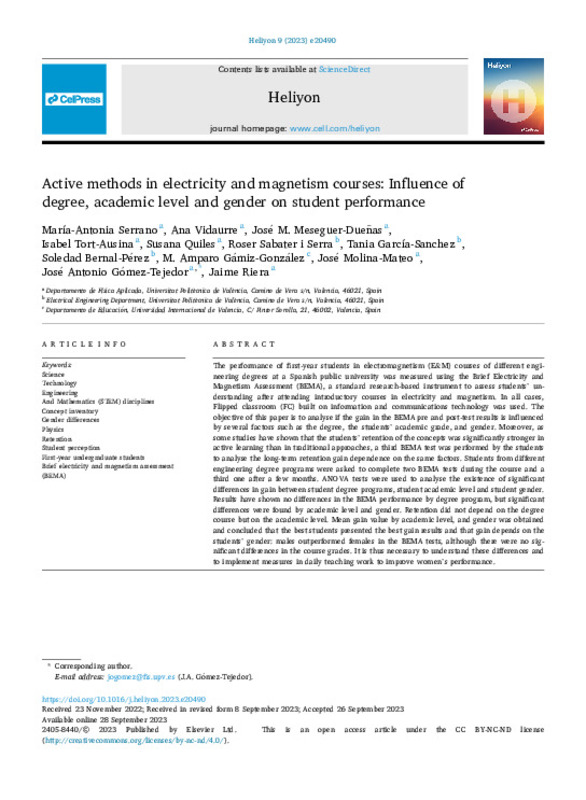Serrano, M.; Vidaurre, A.; Meseguer-Dueñas, JM.; Tort-Ausina, I.; Quiles Casado, SDLS.; Sabater I Serra, R.; García-Sanchez, T.... (2023). Active methods in electricity and magnetism courses: Influence of degree, academic level and gender on student performance. Heliyon. 9(10):1-15. https://doi.org/10.1016/j.heliyon.2023.e20490
Por favor, use este identificador para citar o enlazar este ítem: http://hdl.handle.net/10251/201250
|
Título:
|
Active methods in electricity and magnetism courses: Influence of degree, academic level and gender on student performance
|
|
Autor:
|

 Serrano, María-Antonia
Serrano, María-Antonia

 Vidaurre, Ana
Meseguer-Dueñas, José M.
Vidaurre, Ana
Meseguer-Dueñas, José M.

 Tort-Ausina, Isabel
Tort-Ausina, Isabel
 Quiles Casado, Susana De La Salud
Quiles Casado, Susana De La Salud

 Sabater i Serra, Roser
García-Sanchez, Tania
Bernal-Pérez, Soledad
Gámiz-González, M. Amparo
Sabater i Serra, Roser
García-Sanchez, Tania
Bernal-Pérez, Soledad
Gámiz-González, M. Amparo

 Molina Mateo, José
Molina Mateo, José

 Gómez-Tejedor, José-Antonio
Gómez-Tejedor, José-Antonio

 Riera Guasp, Jaime
Riera Guasp, Jaime
|
|
Entidad UPV:
|
Universitat Politècnica de València. Escuela Técnica Superior de Ingeniería del Diseño - Escola Tècnica Superior d'Enginyeria del Disseny
Universitat Politècnica de València. Departamento de Física Aplicada - Departament de Física Aplicada
Universitat Politècnica de València. Escuela Técnica Superior de Gestión en la Edificación - Escola Tècnica Superior de Gestió en l'Edificació
Universitat Politècnica de València. Escuela Técnica Superior de Ingeniería Geodésica, Cartográfica y Topográfica - Escola Tècnica Superior d'Enginyeria Geodèsica, Cartogràfica i Topogràfica
Universitat Politècnica de València. Escola Tècnica Superior d'Enginyeria Informàtica
|
|
Fecha difusión:
|
|
|
Resumen:
|
[EN] The performance of first-year students in electromagnetism (E&M) courses of different engineering degrees at a Spanish public university was measured using the Brief Electricity and Magnetism Assessment (BEMA), a ...[+]
[EN] The performance of first-year students in electromagnetism (E&M) courses of different engineering degrees at a Spanish public university was measured using the Brief Electricity and Magnetism Assessment (BEMA), a standard research-based instrument to assess students' understanding after attending introductory courses in electricity and magnetism. In all cases, Flipped classroom (FC) built on information and communications technology was used. The objective of this paper is to analyse if the gain in the BEMA pre and post-test results is influenced by several factors such as the degree, the students' academic grade, and gender. Moreover, as some studies have shown that the students' retention of the concepts was significantly stronger in active learning than in traditional approaches, a third BEMA test was performed by the students to analyse the long-term retention gain dependence on the same factors. Students from different engineering degree programs were asked to complete two BEMA tests during the course and a third one after a few months. ANOVA tests were used to analyse the existence of significant differences in gain between student degree programs, student academic level and student gender. Results have shown no differences in the BEMA performance by degree program, but significant differences were found by academic level and gender. Retention did not depend on the degree course but on the academic level. Mean gain value by academic level, and gender was obtained and concluded that the best students presented the best gain results and that gain depends on the students' gender: males outperformed females in the BEMA tests, although there were no significant differences in the course grades. It is thus necessary to understand these differences and to implement measures in daily teaching work to improve women's performance.
[-]
|
|
Palabras clave:
|
Science
,
Technology
,
Engineering
,
And Mathematics (STEM) disciplines
,
Concept inventory
,
Gender differences
,
Physics
,
Retention
,
Student perception
,
First-year undergraduate students
,
Brief electricity and magnetism assessment (BEMA)
|
|
Derechos de uso:
|
Reconocimiento - No comercial - Sin obra derivada (by-nc-nd)
|
|
Fuente:
|
Heliyon. (eissn:
2405-8440
)
|
|
DOI:
|
10.1016/j.heliyon.2023.e20490
|
|
Editorial:
|
Elsevier
|
|
Versión del editor:
|
https://doi.org/10.1016/j.heliyon.2023.e20490
|
|
Código del Proyecto:
|
info:eu-repo/grantAgreement/UPV//PIME%2F18-19%2F88//Lesson para la vertebración de entornos de Docencia Inversa en asignaturas de primer curso. Bases para la introducción de los ODS en la rutina de las asignaturas/
info:eu-repo/grantAgreement/UPV//PIME%2F20-21%2F220/
info:eu-repo/grantAgreement/ICE-UPV//PIME%2F18-19%2F76//Coordinació vertical inter-departamental per a la posta en marxa de metodologies d'avaluació continua i formativa per a l'aprenentatge de la electricitat/tecnologia elèctrica/
|
|
Agradecimientos:
|
Authors would like to thank the Instituto de Ciencias de la Educacion (ICE) in the Universitat Politecnica de Valencia for their help, through the Innovation and Educational Quality Program and for supporting the team of ...[+]
Authors would like to thank the Instituto de Ciencias de la Educacion (ICE) in the Universitat Politecnica de Valencia for their help, through the Innovation and Educational Quality Program and for supporting the team of the Innovacion en Metodologias Activas para el Aprendizaje de la Fisica (e-MACAFI) . This work has been supported by the UPV through the Project of Innovation and Educational Improvement Program (Projects PIME/18-19/76, PIME/18-19/88 and PIME/20-21/220 Convocatoria de Proyectos de Innovacion y Convergencia de la UPV) .
[-]
|
|
Tipo:
|
Artículo
|









